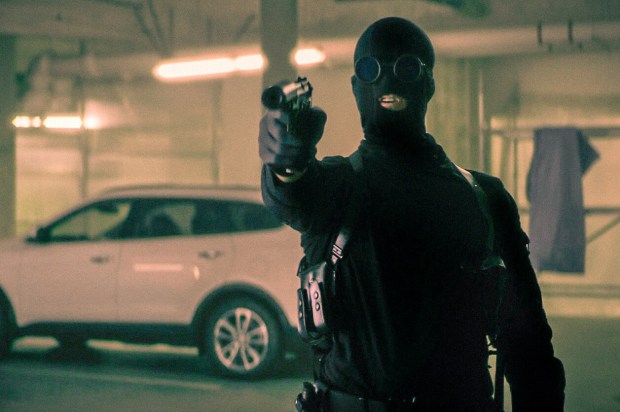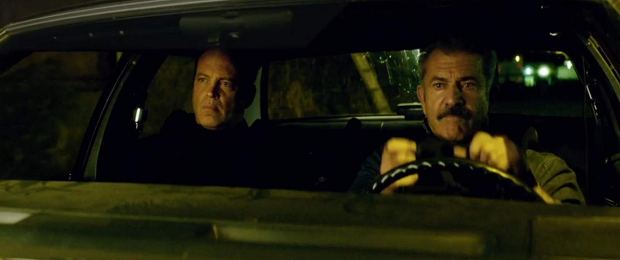Movie Review: ‘Dragged Across Concrete’
Plot: After police detectives Brett Ridgeman (Mel Gibson) and Anthony Lurasetti’s (Vince Vaughn) rough handling of a Hispanic drug dealer during a bust is caught on video, the pair are suspended without pay in order to appease the media. Desperate for cash for their own individual reasons, Ridgeman uses his criminal connections to gain a lead on an impending theft of gold bullion. Meanwhile recently released ex-con Henry Johns (Tory Kittles) is also desperate to get his mother and brother out of their decrepit neighborhood. With the help of his friend Biscuit (Michael Jai White) the two take a high risk, high reward job that could ensure both their financial futures. Both duos’ fates soon collide in an ambitious and violent criminal enterprise where the stakes are high, the consequences potentially fatal, and the outcome unexpected.
Review: Director S. Craig Zahler is a distinctly intriguing director. Originally attending film school to be a cinematographer, Zahler would progress into screenplay writing and novels before directing his first major film in 2015. His previous two works, Bone Tomahawk and Brawl in Cell Block 99 were critically, if not commercially well received. In fact the former I consider to be one of the finest Westerns in the last twenty years. Zahler’s made a name for himself by crafting distinct characters that almost come off as anti-heroes, especially Bradley Thomas from Brawl.
With Dragged Across Concrete, Zahler (who also wrote the screenplay) continues his streak of provocative, gritty, and tense movies. This time delving into the realm of police crime drama, Dragged offers a unique and sometimes bleak look at police brutality, racism, and the struggle to make ends meet in a culture where anything can be instantly filmed and uploaded. A world in which the media, right or wrong, sometimes shapes perception.
Yet Zahler’s film never comes off pedantic or preachy. Indeed he seems to do everything in his power not to cast his four protagonists (if you can call them that) in any specific light or render judgement upon them. He presents them as is. Ridgeman for instance is a casual if not virulent racist but also a family man who’s looking to move his ailing wife and teenage daughter out of a crime ridden neighborhood. He’s an uncompromising throwback who won’t play politics and refers to criminals as “imbeciles.” As such his promotion prospects have withered and died as he approaches sixty. Ridgeman’s decision to dip his toes into the criminal realm comes more from necessity than anything else. Gibson is brilliant in the role, playing Ridgeman with barely repressed intensity. It’s a reminder how great Gibson can be in the right role.
Vaughn is equally great as his younger partner Lurasetti, who gets roped into Ridgeman’s schemes almost by happenstance. Lurasetti is looking to make a future with his potential fiance, yet he’s not nearly as desperate as Ridgeman, constantly telling him, “he’s in until he’s out” regarding the criminal endeavors. Vaughn does an excellent job of fully fleshing out Lurasetti’s character whether it’s his preference for certain suits or his interminably slow eating habits that drive Ridgeman crazy. Both Vaughn and Gibson have great chemistry here and their jarring and brutally honest talk (Ridgeman constantly brings up Lurasetti’s “hot” Italian blood) provoke images of Gene Hackman’s “Popeye” Doyle and Roy Scheider’s “Cloudy” Russo from The French Connection.
As great as Gibson and Vaughn are, Tory Kittles’ Henry is just as impressive. In many ways he’s the mirror image of Ridgeman, a man desperate to get his disabled brother and mother (who’s turned to prostitution to make ends meet) out of desperate financial circumstances. Kittles, like Ridgeman, is driven by necessity. He doesn’t want to delve into criminal activity but feels he has no choice. Henry’s story in some ways is even more compelling and interesting than Ridgeman and Lurasetti’s and despite being a criminal, I couldn’t help at times but to root for him. Indeed I found that to be the case with all four of the main characters. It’s a testament to Zahler’s screenwriting and storytelling abilities that I became that invested in the outcome of these four men.
Like his previous two films, Dragged is punctuated by ultra-violence. It’s decidedly over-the-top on purpose, reminiscent of some of the brutality of 80s actioners. Yet it’s almost cartoonish in its lack of realism. The blood and rent flesh are clearly fake but I believe that’s by design. Zahler’s film never presents the violence in a glamorous light, something violent films do all too often. In many ways it’s an homage to the hard boiled/grindhouse crime films of the 1970s. Indeed, aside from cell phones and a few other nods to modernity, Dragged Across Concrete could have been excised from that bygone decade.
Dragged Across Concrete is not without a few minor faults however. A slow burn, it’s somewhat long at almost three hours. Jennifer Carpenter’s (TV’s Dexter) character of Kelly is also wasted in a part that amounts to nothing more than a cameo. The part seems only to emphasize the brutality of the real criminals. However, it’s a somewhat interesting comment on violence and how cruel fate can be. Also the coda to Dragged Across Concrete takes a bit of a leap in logic on the part of the viewer, and may rub people the wrong way. Although to be honest it didn’t affect my broad impression of the film.
These are minor quibbles though. Overall, Dragged Across Concrete serves as interesting unintentional social commentary and is without question a compelling and dynamic police crime drama. The performances are top-notch and the writing impeccable. I can’t wait to see what Zahler offers up next.
My rating System:
0-1 God Awful Blind Yourself With Acid Bad
2 Straight Garbage
3 Bad
4 Sub Par
5 Average
6 Ok
7 Good
8 Very Good
9 Great
10 A Must See
Dragged Across Concrete: 9/10




